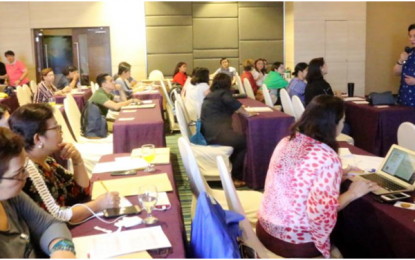
FREE BLOOD. Department of Health (DOH)-Calabarzon Regional Director Dr. Eduardo C. Janairo discloses plans to provide patients in Calabarzon with blood products for free and readily available when needed, during the National Voluntary Blood Services Program (NVBSP) Stakeholders Forum at the H2O Hotel in Manila on Aug. 30-31, 2018. (Photo courtesy of DOH-MRCU)
CALAMBA CITY, Laguna – Department of Health (DOH)-Calabarzon plans to make available blood products without any cost to the patient and readily available when the need arises through the establishment of a blood service delivery network.
DOH Calabarzon Regional Director Dr. Eduardo C. Janairo disclosed this as he graced the two-day National Voluntary Blood Services Program (NVBSP) Stakeholders Forum at the H2O Hotel in Manila on Aug. 30-31.
“We will exert efforts to make this system work by next year and hoping that all regions will follow suit, ”Janairo assured forum participants from the Philippine Red Cross and various blood programs and hospitals in the Calabarzon region comprising Cavite, Laguna, Batangas, Rizal and Quezon,
“Our objective is to make all blood products free, readily available, everybody knows where to get them and to establish a system where no one will ever complain because of the need for blood,” Janairo said.
He also mulled the establishment of a service delivery network for acquiring blood products for the Calabarzon Region.
"There will be a proper transportation of blood products from the facility to the location of the person needing blood, and there will be a continuous supply of blood products at all times,” Janairo said, citing “there should be no queuing and looking for someone to donate blood as replacement for the blood needed for transfusion."
He also wants to avoid scenarios, where patients and their kin go through the rigors of searching for the needed blood as “the patient might already be dead before the relatives can find a suitable blood donor.”
The DOH Calabarzon regional chief also vowed to work for processing fees to be subsidized by the government and urged to continue to support all community activities to make blood available for generations to come.
“We must strengthen and unify our efforts to make this endeavor possible. Blood should be shared. It is a humanitarian thing and it should not be paid for because it is free,” he said.
According to Glen S. Ramos, DOH media relations and communications unit (MRCU) officer, the Calabarzon Region currently has three blood centers; 14 blood banks with hospital based functions (for Levels 1, 2 and 3); four non-hospital based blood collecting units (BCU)/blood stations (BS); 23 hospital based level 1 blood stations and 56 hospital-based level 1 and 2 blood stations.
Meanwhile, NVBSP-Calabarzon Regional Coordinator Myla Velgado also presented to health officials, hospital and blood collection representatives the regional accomplishments where a total of 144,098 whole blood units were collected, or 98 percent of its 146,593 units target ed for 2017.
Velgado said the NVBSP-Calabarzon collected 69,070 whole blood units from January 1 to June 30 this year, with Laguna topping the number of blood units collected with 20,037; Batangas with 17,134; Cavite with 14,137; Rizal – 10,199; and Quezon with 7,563 whole blood units. (PNA)
